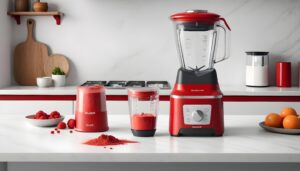Are Cooking Blenders Worth It?
So, you’ve just started getting into cooking and you’re thinking about buying a blender for your kitchen. But before you make a decision, let’s figure this out: are cooking blenders worth it?
Blenders seem pretty cool, right? They promise to make cooking easier by helping you chop and mix things quickly.
But are kitchen blenders as great as they seem? Do you really need one in your kitchen, or are they just going to take up space?

Where was the blender invented?
Ever wondered where blenders came from? Well, let me tell you a story of the kitchen blender history!
Back in 1922, a man by the name of Stephen Poplawski, a Polish-American inventor owned a soda fountain. Pelowski was searching for a way to efficiently mix malted milkshakes.
His solution was a simple yet ingenious device: a spinning blade at the bottom of a container. The blender quickly became popular in homes and restaurants everywhere.
Where was the Blender Invented? Here is an in-depth article on The Kitchen Blender History

Advantages and disadvantages of a kitchen blender
Kitchen blenders have changed the game regarding cooking, making things quicker and easier. But like any tool, there are pros and cons associated with kitchen blenders.
Kitchen blenders can easily mix ingredients, making smoothies, soups, and sauces. They save time and energy in food preparation thanks to their powerful motors and sharp blades.
Moreover, blenders help incorporate nutritious fruits and vegetables into daily meals, promoting healthier eating habits. They’re versatile, too, allowing for the creation of homemade nut butters, dips, dressings, and even batters for pancakes or crepes.
However, kitchen blenders have their downsides despite being useful tools. They can be noisy due to their powerful motors, which might bother people, especially in quiet settings. Cleaning them after each use is a must, as it involves taking them apart and washing them thoroughly.
Safety is also a concern, especially when dealing with hot liquids or hard ingredients that can splatter or damage the blender.

Kitchen blender alternatives
If you don’t have a blender, There are plenty of alternatives to consider for various kitchen tasks. Here are the alternatives:
- Immersion Blender: Also known as a hand blender, this portable tool can blend ingredients directly in pots, bowls, or cups.
- Mortar and Pestle: Ideal for grinding and crushing spices, herbs, and small quantities ingredients into a paste or powder.
- Whisk: Use a whisk to manually blend ingredients, whip cream, or beat eggs until smooth and frothy.

- Hand Mixer: Perfect for mixing batters, doughs, and creams, offering more control and versatility than manual mixing.
- Blender Bottle: Ideal for making protein shakes or smoothies on the go, with a built-in mixing ball to blend ingredients effectively.
- Coffee Grinder: Can be used to grind spices, nuts, or seeds into fine powders for seasoning blends or baking.
- Manual Juicer: Extracts juice from fruits like citrus by hand-operated pressing, providing fresh juice without the need for electricity.
- Rolling Pin and Plastic Bag: Place ingredients in a sturdy plastic bag and use a rolling pin to crush or blend them into smaller pieces.
- Hand Chopper: Requires manual chopping motion but can effectively chop vegetables, nuts, or herbs into desired sizes.
- Knife and Cutting Board: Sometimes, all you need is a good old-fashioned knife and cutting board to chop, dice, and mince ingredients finely.
Are blender bottles dishwasher-safe?
So, is blender bottle dishwasher safe?
The answer is yes. Most blender bottles can be washed in the dishwasher, but it’s a good idea to check the instructions first. Blender bottles are usually made from BPA-free plastic or stainless steel. They can handle the dishwasher’s heat and power.
However, some parts, like rubber seals or blender ball inserts, might need hand washing to keep them in good shape.

Are blender bottles microwave safe?
Blender bottles are generally not safe to put in the microwave. They’re usually made of materials like plastic or stainless steel, which can get damaged or release harmful chemicals when heated.
Plus, they often have parts like blender ball inserts or rubber seals that can’t handle microwave heat.
Kitchen mixer leaking: What is the solution?
When a kitchen blender starts leaking, it messes up the blending process, making it hard to mix ingredients properly. This can mean your recipes don’t turn out right.
To fix a leaking kitchen blender, start by checking for loose or damaged parts like the blade assembly or jar.
Tighten loose parts or replace damaged ones. Make sure the blender jar is securely attached to the base and the lid is sealed properly.
If the problem persists, contact the manufacturer for help or consider getting a new blender.



Hi, this is a comment.
To get started with moderating, editing, and deleting comments, please visit the Comments screen in the dashboard.
Commenter avatars come from Gravatar.